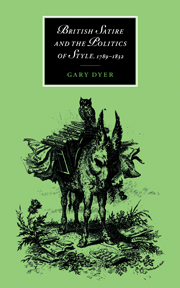Book contents
- Frontmatter
- Contents
- Acknowledgments
- Note on the text
- Introduction
- 1 The scope of satire, 1789–1832
- 2 The modes of satire and the politics of style
- 3 The meaning of Radical verse satire
- 4 Peacock, Disraeli, and the satirical prose narrative
- 5 Satire displaced, satire domesticated
- Notes
- Works cited
- A select bibliography of British satirical verse, 1789–1832
- Index
- Cambridge Studies in Romanticism
4 - Peacock, Disraeli, and the satirical prose narrative
Published online by Cambridge University Press: 02 December 2009
- Frontmatter
- Contents
- Acknowledgments
- Note on the text
- Introduction
- 1 The scope of satire, 1789–1832
- 2 The modes of satire and the politics of style
- 3 The meaning of Radical verse satire
- 4 Peacock, Disraeli, and the satirical prose narrative
- 5 Satire displaced, satire domesticated
- Notes
- Works cited
- A select bibliography of British satirical verse, 1789–1832
- Index
- Cambridge Studies in Romanticism
Summary
The author of this work, and of several similar productions, is, we understand, a Mr. Peacock. It would be difficult to say what his books are, for they are neither romances, novels, tales, nor treatises, but a mixture of all these combined. They display a sort of caricature of modern characters and incidents; executed with greater license than nature, and with more humour than wit.
The Literary Gazette, reviewing Nightmare Abbey in 1818[Disraeli] was much delighted with Peacock, and surprised to find in him the author of “Headlong Hall,” and calling him his “master” but, says Peacock to me, “I did not know he was my pupil.”
John Cam Hobhouse, on Disraeli's visit to his house, December 22, 1848The previous two chapters have examined the political and ideological implications the tragic and comic poles of satirical poetry had between 1789 and 1832, and have gone on to explore the ways satires contain, circumvent, or reinforce their attack on present-day abuses. This chapter looks at Thomas Love Peacock's six book-length fictional narratives from the years 1815 to 1831 – that is, Headlong Hall (1815, dated 1816), Melincourt (1817), Nightmare Abbey (1818), Maid Marian (1822), The Misfortunes of Elphin (1829), and Crotchet Castle (1831). I also consider, more briefly, Benjamin Disraeli's little-known fantastic journey The Voyage of Captain Popanilla (1828). My purpose is to analyze, above all, how these texts are affected by the crippling limitations of contemporary models for fictionalized depictions of public figures. With the Peacock satires, I want to define the peculiar impersonality of his satirical attack and to recognize how this impersonality bolsters the specifically comic side of his fiction.
- Type
- Chapter
- Information
- British Satire and the Politics of Style, 1789–1832 , pp. 94 - 138Publisher: Cambridge University PressPrint publication year: 1997



